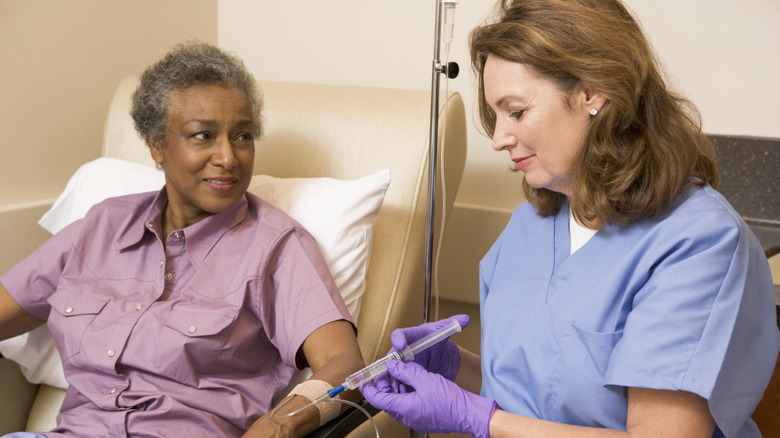The Drug Combo That Could Change The Game For Women With Endometrial Cancer
Also referred to as uterine cancer, endometrial cancer occurs as a result of cell overgrowth in the endometrium, or uterine lining (via Mayo Clinic). While there is no known cause for endometrial cancer, some individuals may be at an increased risk for the condition, including those with no history of pregnancy, people who started menstruating before the age of 12, older adults, as well as those with certain health conditions that increase levels of estrogen in the body.
Depending on the severity of the cancer, cases of endometrial cancer are categorized as either grade 1, 2, or 3. Grade 3 cases generally grow and spread more quickly than grade 1 or 2 cancers, according to the American Cancer Society.
Treatment options can range from surgical procedures to drug therapies. This may include chemotherapy, radiation therapy, immunotherapy, hormone therapy, and targeted drug therapy. Instead of receiving only one singular drug therapy, however, research shows that a combination of drug therapies may be more effective in protecting against cancer recurrence in women diagnosed with endometrial cancer (via NBC News).
How chemotherapy and immunotherapy may reduce endometrial cancer recurrence
Both published March 27, 2023, in The New England Journal of Medicine, two studies suggest that administering immunotherapy medications in combination with chemotherapy treatment for patients with endometrial cancer may stave off the return of tumors (via NBC News).
In the first study, 816 patients diagnosed with either advanced or recurrent endometrial cancer received either a placebo or the immunotherapy drug pembrolizumab alongside routine chemotherapy treatments. Patients underwent six cycles of treatment every three weeks, and then 14 maintenance cycles every six weeks.
Over the course of a year-long analysis period, researchers determined that disease progression-free survival rates stood at 74% in endometrial cancer patients who received the combination immunotherapy treatment. In comparison, progression-free survival rates measured at 38% in patients who received the placebo. On average, those who received the combination treatment went just over 13 months without any signs of disease progression compared to an average of 8.7 months amongst the control group.
Combination treatment may increase patient survival rates
In the second study, nearly 500 patients with either recurrent or advanced stage 3 or 4 endometrial cancer were given either a placebo or 500 milligrams of the immune-checkpoint inhibitor drug dostarlimab in combination with chemotherapy treatments. Patients received six treatment cycles every three weeks, which then changed to either a placebo or 1,000 milligrams of dostarlimab alongside chemotherapy every six weeks for as long as three years.
The study findings revealed that at the two-year mark, patients who received the combination treatment had a progression-free survival rate of approximately 36% compared to 18% amongst the placebo group. Overall survival stood at approximately 71% for the combination treatment group and 56% in the placebo group after two years.
In response to the research, some experts feel these findings have the potential to influence future endometrial cancer treatment methods. "Patients with either advanced or recurrent endometrial cancer don't have a lot of great treatment opportunities," Dr. Pamela Soliman, a gynecologic oncologist at MD Anderson Cancer Center in Texas, told NBC News. "This is really practice-changing."



